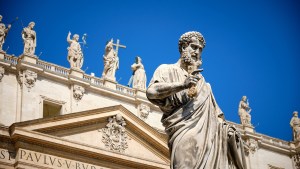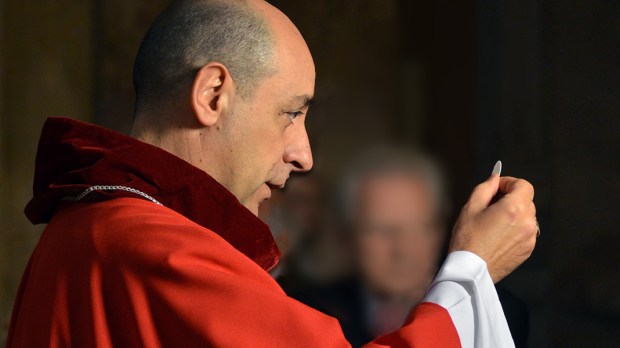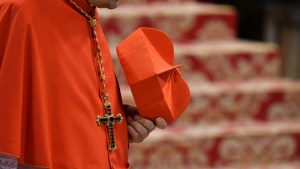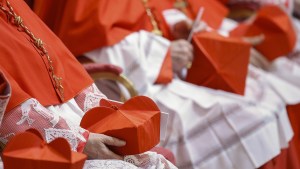Pope Francis has promoted 60-year-old Argentinian Archbishop Víctor Manuel Fernández to the cardinal’s purple, just days after appointing him Prefect of the Dicastery for the Doctrine of the Faith (DDF). With this appointment within the Roman Curia, the Pontiff brought to Rome a theologian who is very close to him.
Priestly ministry
Víctor Manuel Fernández was born on July 18, 1962, in Alcira Gigena, in the province of Córdoba, Argentina. He was ordained a priest on August 15, 1986, for the Diocese of Villa de la Concepción del Río Cuarto. After studying biblical theology at the Pontifical Gregorian University in Rome, he completed a doctorate in theology at the Faculty of Theology in Buenos Aires.
During his ministry in his Diocese of Córdoba, Fr. Fernández was not only parish priest, but also seminary formator, and in charge of ecumenism and catechesis. He also founded an institute for the formation of lay people and teachers. In 2008 and 2009, Fr. Fernández was president of the Argentine Theological Society and Dean of the Faculty of Theology at the Argentine Catholic University.
In 2009, he was appointed rector of the same university by the then-archbishop of Buenos Aires, Cardinal Bergoglio. The two men are indeed close friends. In 2007, they were both part of the group that drew up the “Aparecida document,” at the conclusion of the Fifth Conference of Latin American Bishops — a text considered to be programmatic for the current pontificate. But Father Fernández’s appointment as rector was initially blocked by the Vatican, forcing Cardinal Bergoglio to come to Rome to plead his case. He finally obtained Benedict XVI’s approval in 2011.
Close collaboration with Pope Francis
There have been signs that the two Argentinians continue to be close. Barely two months after his election, on May 13, 2013, Pope Francis appointed the rector an archbishop. Archbishop Fernández was consecrated bishop on June 15 of the same year. In 2014, Archbishop Fernández published a book outlining “Pope Francis’ Project” (“El Programa del Papa Francisco: ¿Adonde nos quiere llevar?” — not yet available in English).
He is also considered one of the authors behind the apostolic exhortation Amoris laetitia. This document was published following the 2014 and 2015 Synod of Bishops on the family, in which Fernández participated.
The 266th Pope entrusted him with the reins of the Diocese of La Plata in 2018. Within the Argentine Bishops’ Conference, he was the President of the Commission for Faith and Culture from 2017 to 2023. He is also the author of numerous publications, translated into various languages, addressing biblical and social issues as well as human themes.
A tailor-made position at the DDF
On July 1, 2023, Pope Francis named him prefect to succeed the Spanish Jesuit Cardinal Luis Ladaria as head of the Dicastery for the Doctrine of the Faith, the Holy See’s “guardian of dogma.” The future cardinal will also be president of the Pontifical Biblical Commission and the International Theological Commission.
This announcement comes as a surprise, as other candidates were being considered. It’s also a rare event: With this appointment, Pope Francis sent him a mission statement, an unusual element for a curial appointment.
The Argentinian’s profile marks a break with the past. In a book published at the beginning of the year, the former prefect of the Doctrine of the Faith, Cardinal Gerhard Ludwig Müller, who was dismissed in 2017, cites Bishop Fernández among his detractors. More broadly, he criticizes South American theologians who defend “the primacy of pastoral practice” over dogma.

Controversy surrounding his appointment
As soon as his appointment was announced, Archbishop Fernández was hit with virulent criticism. Some accused him of inaugurating a dicastery “against the Doctrine of the Faith,” others of representing “the triumph of relativism.” Many analysts are surprised that the Pope, in his mission statement, seems to be lightening his load in terms of the fight against abuses, despite this being one of the dicastery’s battles.
In a message posted on social networks, he revealed that he had already turned down the post in the past. He explained that this was because he didn’t feel up to the task of dealing with the issue of abuse of minors, a responsibility of the DDF’s disciplinary section. Pope Francis, he explains, overruled his reservations, however, by offering him a tailor-made post: The new prefect’s priority will be “the dicastery’s main objective, which is to ‘keep the faith.'”
In moral theology, Archbishop Fernández advocates “the primacy of charity” and paying attention to how “the poorest, most limited people, excluded from the benefits of society,” face life. He expresses his concern that “any theological idea that ultimately ends up putting God’s omnipotence in doubt, and his mercy in particular,” is unacceptable. He adds that “this obliges us to rethink many other things.”
Mismanagement of an abuse case in La Plata?
The American organization BishopAccountability.org, which manages archives on abuse committed in the Catholic Church, described Pope Francis’ choice as “baffling and troubling.” According to the organization, the prelate mishandled the case of a pedophile priest in the Diocese of La Plata in 2019. For the organization, Bishop Fernández “should have been investigated, not promoted to one of the highest posts in the global Church.”
In an interview with AP, the Argentine archbishop acknowledged his errors in handling the affair. “I cannot say that I have committed a crime or something against what was established at that time, but that I could have been a much better father, much better pastor and much more efficient,” he admitted.
The new prefect took up his new post on September 11.




